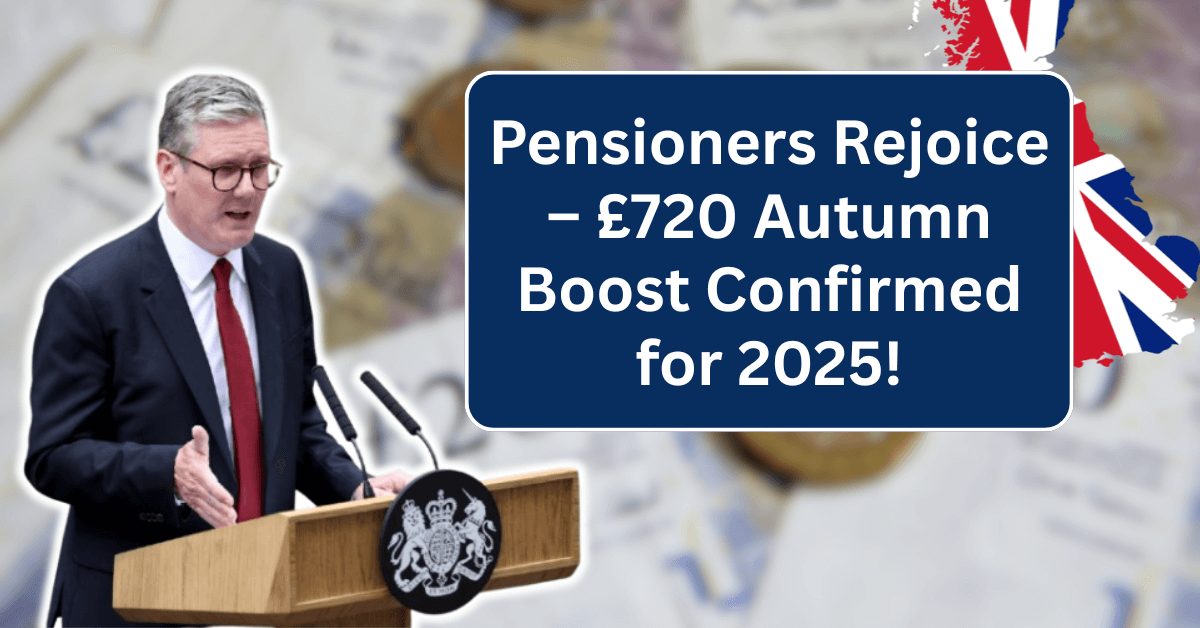The Department for Work and Pensions (DWP) has finally confirmed welcome news for millions of UK pensioners this autumn. From September 2025, pensioners are set to receive a £720 boost in their income, easing the pressure caused by rising household bills and stubborn inflation.
This article breaks down everything you need to know — who qualifies, how much extra you’ll get, the payment dates, and what this means for your long-term retirement income.
What Is the Autumn 2025 Pension Boost?
The Autumn 2025 pension boost is part of the government’s ongoing adjustment to state pension and related benefits. Designed to support pensioners struggling with the cost of living, the one-off increase of £720 will be distributed to millions of households across the UK.
This boost is separate from the annual triple lock increase, which raises pensions each April in line with inflation, earnings, or 2.5% (whichever is highest).
Why Is the Government Giving This Extra Payment?
The DWP has faced intense pressure from both MPs and campaigners who argue that older people are being hit the hardest by rising living costs. Energy bills, food prices, and housing expenses have all risen sharply since 2022, while many pensioners live on a fixed income.
The £720 top-up is seen as a way to provide immediate relief before the winter period, when heating and energy costs rise further.
Who Qualifies for the £720 Autumn 2025 Pension Boost?
Eligibility is straightforward but comes with a few conditions. Pensioners must:
- Be living in the UK and receiving the state pension.
- Have reached the state pension age before 1 September 2025.
- Be actively claiming their pension (not deferred).
In addition, certain pension credit recipients may see their payments increased even further.
How Much Will You Get in Total?
The confirmed figure is £720 for most eligible pensioners. However, depending on your circumstances, you could receive more. For example:
- Single pensioners claiming Pension Credit may see a slightly higher adjustment.
- Couples could benefit from a combined boost of over £1,400.
- Disabled pensioners and those receiving Attendance Allowance may also see linked increases.
When Will the Extra Payments Arrive?
The DWP has announced that payments will begin from mid-September 2025, with the rollout continuing until the end of October 2025.
Payments will be made directly into pensioners’ bank accounts, using the same details as their regular state pension payments.
Pensioners do not need to apply — the money will arrive automatically.
How Does This Affect the State Pension Going Forward?
It’s important to understand that this £720 boost is a one-off payment, not a permanent increase in the state pension rate.
From April 2026, pension increases will continue to follow the triple lock system. If inflation and wages remain high, pensioners could see another significant rise.
Pensioners’ Reactions to the News
Many older people have welcomed the announcement, calling it a “lifeline” at a time of rising costs.
However, some campaigners argue that a one-off payment is not enough to address the wider challenges pensioners face. The UK state pension remains one of the lowest in Western Europe when compared to average earnings.
How Does the £720 Boost Compare to Past Support?
This isn’t the first time the government has stepped in with one-off support. In recent years, pensioners have received:
- Cost of Living Payments during the energy crisis.
- Winter Fuel Payments, which are still ongoing.
- Cold Weather Payments in certain extreme conditions.
The Autumn 2025 Pension Boost is larger than most of these single payments, showing the scale of pressure on retirees.
Could This Affect Your Other Benefits?
One common question is whether the £720 boost will affect means-tested benefits such as Housing Benefit or Council Tax Support.
The DWP has confirmed that this payment will be treated as non-taxable and non-deductible, meaning it should not reduce your entitlement to other benefits.
What Pensioners Should Do Next
If you are already claiming the state pension, there is nothing you need to do. The payment will arrive automatically between September and October 2025.
However, if you are not yet claiming your pension but are eligible, you should apply immediately to avoid missing out.
Expert Advice for Pensioners
Financial experts recommend that pensioners use this payment wisely:
- Cover essential expenses such as heating and electricity bills.
- Consider using part of it to pay off debts.
- Save a portion for unexpected costs over winter.
For those who are struggling, seeking free financial guidance from organisations like Age UK or Citizens Advice can make a big difference.
What Does This Mean for the Future of UK Pensions?
While this payment is good news, it raises bigger questions about the long-term sustainability of the pension system. With the state pension age expected to rise in the coming years, campaigners are pushing for stronger protections for retirees.
The government faces pressure to ensure that pensioners are not left behind as living costs rise. Many believe that more permanent reforms are needed rather than one-off payments.
Key Takeaways
- Pensioners will receive a £720 boost in autumn 2025.
- Payments will arrive between September and October 2025.
- No application is required — it will be paid automatically.
- The payment will not affect other benefits.
- While welcome, experts say long-term reforms are still needed.
Final Thoughts
The Autumn 2025 Pension Boost offers relief at a critical time for UK retirees. For many pensioners, an extra £720 could help cover bills, groceries, or rising winter energy costs.
But the bigger debate about whether the state pension is enough to live on continues. As the UK heads into an uncertain economic future, pensioners will be watching closely to see whether this is the start of more meaningful support — or just another temporary fix.
